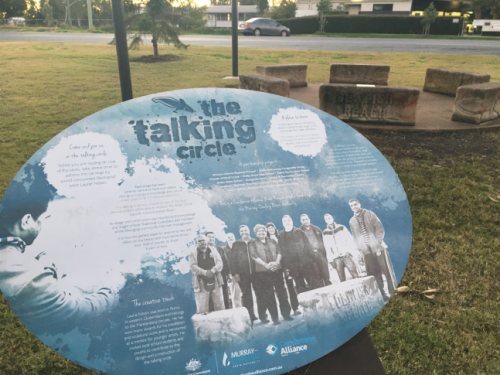
Dalby’s Talking Circle
I was in Dalby for a couple of days recently, talking with some locals about resilience and difficult behaviour. At the end of the first day, I went for a walk around town and learnt (quite coincidentally) about Dalby’s Talking Circle. Let me tell you about the importance of face-to-face discussions.
What is it? Nestled on the banks of the Myall Creek on the Western Darling-Downs, this talking circle sits 500m to southeast of Dalby’s Post Office (pop. 15,000), 65km southeast of the Bunya Mountains, and 200km north-west of Brisbane.
Why’s it important? Quoting from the display shown here, a Talking Circle is a place to share a yarn or two. In aboriginal culture, a talking circle is a place to talk, laugh, share knowledge and make decisions. The circle is an important symbol in aboriginal culture as it represents equality, inter-connectedness, and continuity. Sitting in a circle allows each person to be part of the discussion, so participants have the opportunity to share their ideas and opinions with the group, as well as to listen to what others have to say. Everyone is included and no one is more important than the other. The talking circle is also a way to make decisions. Members of the aboriginal community would gather in a circle to discuss an important issue. And the resolution could only be achieved when everyone agreed.
Why’s that important? Covid has taught us to be wary of coming together face-to-face. And digital meetings (post-covid) are an efficient use of time to share data and information with your team. But corporate idea-generation, productivity, and well-being is at stake.
Out here on the Western Darling-Downs, people matter.
- Dalby is a portal from Eastern to Northern Australia, and essentially a spot where Australian cultures have collided for 20,000 years.
- In Dalby I could smell the truckloads of cattle in the air as they traveled past on ever-efficient road trains.
- Their iconic events capture the essence of this region, including the Big Skies Festival (Oct) and Chinchilla Melon Festival (Feb).
- On my 400km round trip, I saw constant signs of cotton strewn roadside, and drove past Toowoomba’s new(ish) airport.
I know something about the region, having studied as an undergraduate in Toowoomba’s University of South Queensland. But as a facilitator, I see tremendous potential in businesses coming together face-to-face (ie. the ‘last three feet’) to discuss important issues with your team, group or mob.
By coming together face-to-face for discussion, humans have learnt to trust each other during periods of change. They’ve learnt to adapt by communicating more deeply, and understanding differing perspectives through the nuanced sharing of meaning that’s a challenge when people come together from different tribes.
By understanding a little more about Dalby’s Talking Circle, hopefully you can transfer your team’s individual information into collective knowledge. Surely that’s of benefit for your customer, your team and the sustainability of your business longer-term.
For more on:
- Carvings and project management by aboriginal artist Laurie Nielsen. The Dalby Talking Circle is a perfect place for anyone to rest and reflect on the beauty and the importance of the Myall river. The Condamine Alliance River Rescue Project was funded by the Murray Darling basin authority, and reflects aboriginal ecological knowledge and culture.
- How to use Talking Circles for deep communication
- Western Downs Council (Big Sky Country) – It’s the people that make it.
- Dalby’s history, see “From swamp to city ‘1863-1963’: The story of Dalby, city of wheat-sheaves and gateway to Queensland oil [A souvenir history of Dalby compiled and designed by G.H. Wade for the Council of the Town of Dalby]” from University of Queensland’s library.
- Educated in natural history, Ludwig Leichhardt led an expedition from Dalby (Queensland) overland to Port Essington (Northern Territory), October 1844-December 1845.
- The author lives on Turrbal country – Killindarbin (Ashgrove). In the spirit of reconciliation Edmonds Facilitation acknowledges the Traditional Custodians of country throughout Australia and their connections to land, sea and community. We pay our respect to their Elders past and present and extend that respect to all Aboriginal and Torres Strait Islander peoples today.

